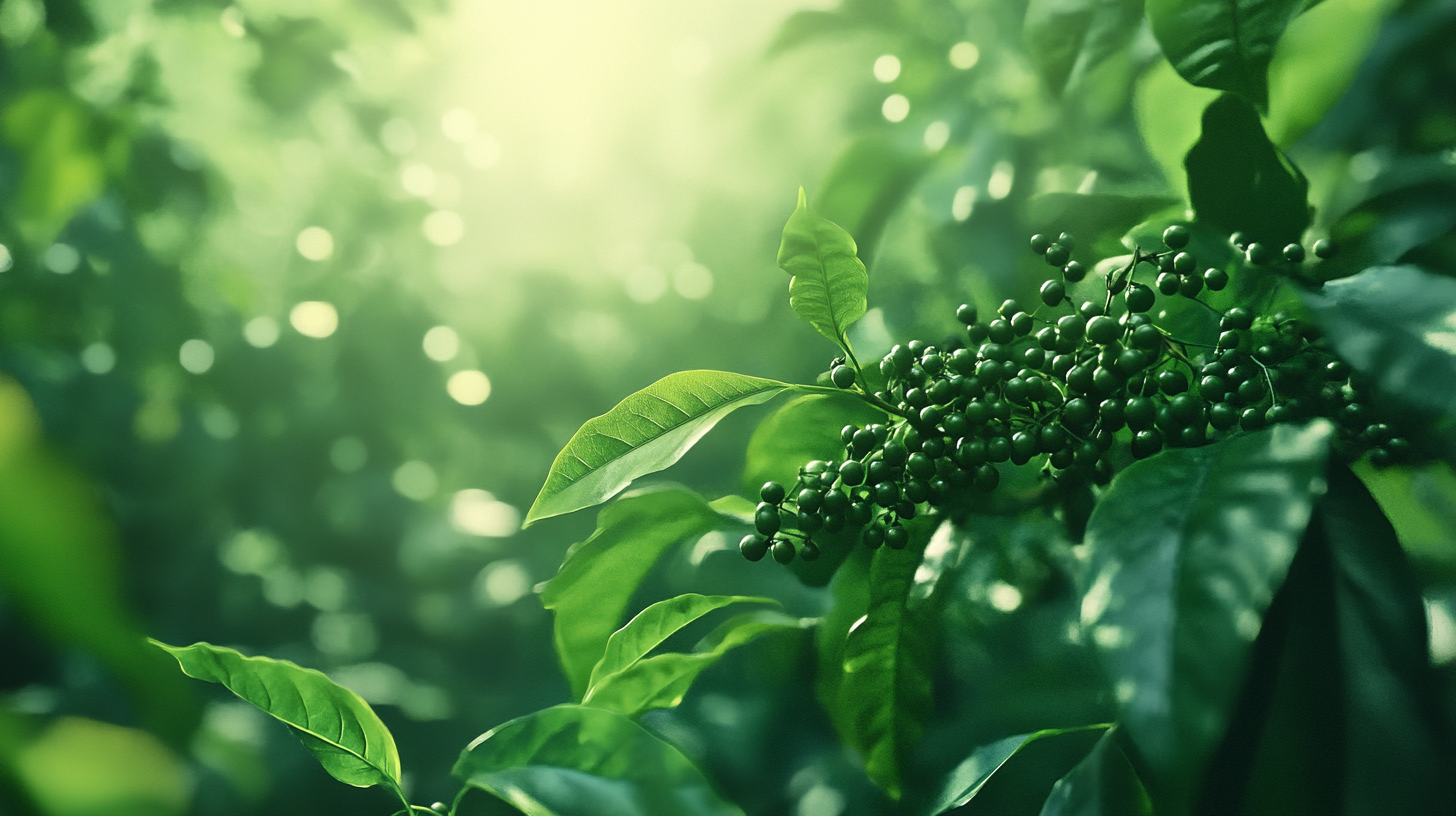The Evolution of Black Pepper Extract in Global Trade
In the realm of global trade, few commodities have a history as rich and complex as that of Black Pepper Extract. Once revered as the "king of spices," black pepper has transcended its culinary roots to become a vital component in various industries, from pharmaceuticals to cosmetics. This evolution is not merely a tale of economic significance; it reflects cultural exchanges, agricultural advancements, and shifts in consumer preferences over centuries. The journey of Black Pepper Extract showcases how a simple spice can influence trade routes, inspire commerce, and connect diverse populations through a shared appreciation for flavor and wellness.
As we delve into the intricate history of Black Pepper Extract, we will explore its origins, the changes in its market demand, and the innovations that have propelled it into contemporary usage. Understanding this evolution is essential not only for historians and economists but also for those in industries currently leveraging this powerful extract. Through examining key milestones and trends, we aim to highlight the continuing impact of Black Pepper Extract in today's global marketplace and its potential for future growth and sustainability.

Historical Significance of Black Pepper in Ancient Trade Routes
Black pepper, often referred to as the "King of Spices," has played a pivotal role in ancient trade routes, significantly influencing global commerce and culinary practices. Originating from South India, it was prized not only for its flavor but also for its preservative qualities and medicinal attributes. Historical records indicate that as early as 2000 BCE, black pepper was traded via overland routes through the Arabian Peninsula to the Mediterranean. The spice was so valuable that it was often referred to as "black gold," and was even used as a form of currency. According to a report by the Food and Agriculture Organization (FAO), global production of black pepper has seen a consistent increase, reaching approximately 450,000 metric tons in 2020, with India, Vietnam, and Brazil being the top producers. The spice's popularity remained unbroken throughout history, with merchants facilitating its trade along the famed Silk Road. The demand for black pepper in Europe surged during the Middle Ages, leading to the establishment of the Spice Trade, where it was exchanged for gold and other precious commodities. Moreover, the burgeoning exploration in the 15th and 16th centuries, epitomized by figures like Vasco da Gama, was largely motivated by the quest for spice routes. The consequences of this exploration not only reshaped trade but also heralded an era of cultural exchange that would enrich both the Old World and New. The legacy of black pepper’s historical significance is thus not merely a tale of a spice; it represents the interconnectedness of ancient economies and the genesis of global trade practices that continue to evolve today.

The Role of Black Pepper Extract in Modern Culinary Practices
The role of black pepper extract, particularly its active compound piperine, has evolved significantly in modern culinary practices, driven by both flavor enhancement and health benefits. Recent comprehensive reviews on the extraction and bioactivity of piperine highlight its pungency, which not only elevates the sensory experience of dishes but also contributes to various bioactive properties. Piperine's ability to enhance the bioavailability of nutrients and other compounds makes it a valuable ingredient, particularly in culinary applications combining spices like turmeric, which has been noted for its extensive health benefits.
In terms of global trade, the increasing recognition of black pepper extract as a functional food ingredient is reflected in the growing number of patents related to its use. For instance, significant milestones have been reached with over 400 patents granted specifically for black pepper extracts, underscoring the innovation within the industry. As culinary professionals and food companies look to enhance the appeal of their products, the integration of black pepper extract is becoming more common, leveraging its unique flavor profile while simultaneously promoting health and wellness.
Furthermore, ongoing research continues to explore the multifaceted benefits of black pepper extract in culinary applications. Studies investigating its effects on sexual function and potential synergistic benefits with other spices enhance its desirability in the marketplace. This multifactorial role of black pepper extract underscores its significance not merely as a spice but as an ingredient in the ever-evolving landscape of modern culinary arts, where health consciousness aligns with flavor innovation.

Economic Impact of Black Pepper on Global Markets and Trade
The global market for black pepper extract has seen significant economic implications over the years, particularly as the spice becomes increasingly sought after across various sectors. Black pepper, often referred to as the "king of spices," has transcended its culinary uses to become a vital ingredient in health supplements, cosmetics, and even the food and beverage industry. With rising health consciousness and demand for natural products, the economic impact of black pepper is evident in its growing trade volume, which contributes substantially to the livelihoods of farmers in producing countries like India and Vietnam.
Moreover, black pepper's role in the global market is reflective of broader trade dynamics. As countries like India seek to expand their export opportunities, the integration of markets plays a crucial role in fostering mutual growth. The economic ties between countries enhance trade relations, leading to better pricing strategies for commodities such as black pepper. This synergy is essential, particularly when evaluating the competitive landscape within the agricultural commodity market, where fluctuations in supply and demand can directly affect global trade patterns.
In the context of competition, black pepper extract is positioned alongside other burgeoning markets, such as sports and energy drinks, which are projected to reach significant valuations by 2033. These industries highlight the interconnectivity of global trade, emphasizing that economic growth is not limited to single products but is a network of interactions among diverse sectors. As nations navigate their economic strategies, understanding the impact of agricultural exports like black pepper becomes vital for sustaining growth and stability in global markets.

Sustainable Sourcing and Ethical Considerations in Pepper Production
The production and trade of black pepper extract have undergone significant changes in recent years, particularly through the lens of sustainable sourcing and ethical considerations. As the global demand for spices increases, driven by a growing seasoning and spices market, which was estimated at USD 21.69 billion in 2023 and is projected to grow at a CAGR of 6.8% from 2024 to 2030, the need for sustainable practices becomes even more critical.
With the spotlight on sustainability, the pepper industry faces challenges, including habitat loss and human rights abuses associated with traditional farming methods. Awareness of these issues is rising, as consumers become more conscientious about the origins of their food. Ethical sourcing practices are essential not only for protecting the environment but also for ensuring fair treatment of laborers involved in pepper production.
Utilizing innovative technologies, such as artificial intelligence, is proving beneficial for companies aiming to enhance their sustainable and ethical procurement practices. By employing AI, businesses can streamline their supply chains, monitor sources, and ensure compliance with sustainability standards. As global market trends continue to evolve, it is imperative for the pepper industry to align with these ethical frameworks, assuring consumers that their culinary staples are produced responsibly and sustainably, thus reinforcing trust in the brand.
Innovations in Extraction Processes and Their Role in Industry Trends
The extraction processes for black pepper have seen significant innovations over recent years, fundamentally altering its profile in the global trade landscape. Traditional methods, often involving simple mechanical or solvent extraction, have evolved to incorporate advanced techniques such as supercritical CO2 extraction and enzyme-assisted extraction. These modern methods not only enhance the purity and concentration of active compounds like piperine but also preserve the rich flavor profile of black pepper. As consumers become increasingly aware of quality and authenticity, these innovations respond to a market demand for superior products with distinct characteristics.
Moreover, the impact of these advancements extends beyond product quality; they also play a pivotal role in sustainability efforts within the industry. By optimizing extraction efficiency and reducing the use of harsh solvents, new methods contribute to a lower environmental footprint, resonating with a growing segment of eco-conscious consumers. Additionally, these improved processes can lead to reduced waste and lower production costs, making black pepper more accessible to manufacturers and ultimately consumers. As such, the evolution of extraction techniques is not merely a technical development but is also intertwined with broader industry trends that prioritize quality, sustainability, and economic viability.

